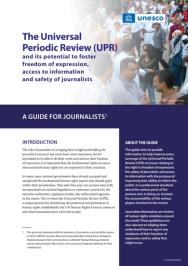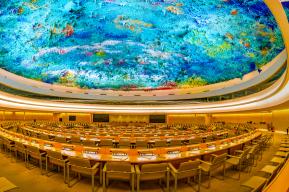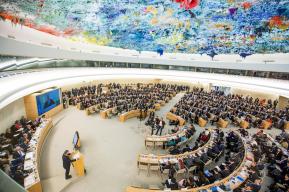
Freedom of Expression and the Universal Periodic Review
To advance fundamental rights, UNESCO works with different stakeholders to use the unique human rights mechanism of the Universal Periodic Review (UPR). This is done by making resources available for those working, or who wish to work, on freedom of expression, safety of journalists and access to information including: civil society organizations, United Nations’ country teams, National Human Rights Institutions (NHRIs), information commissioners and journalists.
The UPR’s potential in improving freedom of expression, access to information and safety of journalists
The Universal Periodic Review is a unique, state-driven process within the UN system, involving the continuous assessment of the human rights records of all 193 UN Member States. The UPR includes recommendations on freedom of expression and safety of journalist issues as well as on access to information. Thus, it provides an opportunity to assess whether the legal and constitutional frameworks sufficiently guarantee freedom of expression, access to information and whether laws are effectively implemented.
This webpage includes all the relevant resources and information on the UPR by UNESCO for those who want to contribute to the UPR in matters related to freedom of expression, the safety of journalists and/or access to information. By making these resources available, UNESCO hopes to increase the visibility of journalists and their work within the international human rights system, build a wider movement to access information, and push back against regressive trends that have stifled progress for freedom of expression.
How to engage with the UPR process?
In an effort to mainstream issues related to the safety of journalists, freedom of expression and access to information in the UPR, UNESCO has developed a series of toolkits for different stakeholders:
This guide aims to provide information to help improve press coverage of the Universal Periodic Review (UPR) on issues relating to the right to freedom of expression, the safety of journalists and access to information with the purpose of improving their ability to inform the public, to a professional standard, about the various parts of the process and, in doing so, increase the accountability of the various players involved in the review.

This note provides suggestions for Member States on how to word the recommendations for the Universal Periodic Review (UPR) in the field of freedom of expression, safety of journalists and access to information. The background and recommendations below can also assist UN Country Teams, National Human Rights institutions (NHRIs) and civil society in relation to UPR submissions and follow up.

These guidelines build upon a joint Amnesty-UNESCO survey of more than 70 civil society respondents from different regions; a series of consultation webinars held between March and June 2022; and comprehensive interviews with civil society organizations from different regions. The survey, available in several languages, measured the level of engagement of civil society with the UPR; coordination between organizations; planning for advocacy and follow up; and enquired about the key challenges and needs for NGOs to effectively contribute to the process.

This document is a part of a joint project between Amnesty International and UNESCO to provide guidance to civil society on advancing freedom of expression, safety of journalists and access to information when engaging with the UN Universal Periodic Review (UPR). We recommend that you first read the companion document The Universal Periodic Review (UPR) and its potential to foster freedom of expression, access to information and safety of journalists: Guidelines for civil society organizations if you are not familiar with the UPR process, or would like to refresh your knowledge, as it will help you understand some of the terms and processes referred to here.

Watch the videos to know more about the UPR process and help you prepare submissions for the UPR review
The daily groundwork of UN Country Teams involves an ongoing dialogue with States, and with broad sectors of society. As such, UNCTs are well-placed to bring a variety of social actors together to advance on national commitments, including those related to information, freedom of expression and the safety of journalists. These Guidelines were designed specifically for them by a former UN Resident coordinator and aim at maximizing the use of the UPR at the country level by providing practical examples for engaging with the UPR prior, during and after the review.

Information Commissioners can provide inputs to the UPR, and they are directly implicated when there are recommendations, accepted by the Member State concerned, about strengthening the right to information in that country. These new guidelines are custom-made for Information Commissioners, Ombudspersons, and any other regulatory authorities, including transparency councils or -boards, engaged in protecting, promoting, and ensuring implementation of access to public information legislation.

Involving NHRIs in the UPR process from the outset increases the potential of implementation of recommended actions domestically. Their participation in the UPR also highlights their role as stakeholders in strengthening respect for human rights at the national level, both by monitoring and assisting governments in upholding their international human rights obligations.
These Guidelines have been specifically designed for NHRIs to maximize the use of the UPR at the country level. They provide practical examples for engaging with the UPR prior to, during and after the review.

Partnerships on the UPR
UNESCO and the Inter-American Commission on Human Rights
UNESCO and the Special Rapporteur on Freedom of Expression of the Inter-American Commission on Human Rights (RELE, in Spanish) have started a 6-month partnership which aims at strengthening the participation of different stakeholders from the Americas on the Universal Periodic Review (UPR) and freedom of expression, safety of journalists and access to information.

Amnesty International and UNESCO
The partnership also includes the development of video tutorials and a fact sheet to support the drafting of specific and measurable recommendations – which are much easier to monitor and help ensure accountability. These will be available in the six official UN languages.
More information on the UNESCO-Amnesty International partnership on the UPR can be found here in all languages: https://www.amnesty.org/en/documents/ior40/5290/2022/en/

The partnership between UNESCO and Amnesty International provides tools for civil society organizations across the world to help them engage more effectively with the UPR. It empowers civil society organizations to raise freedom of expression concerns in their UPR engagement and to follow up, so those commitments are implemented at a local level. Tools include guidelines on how to engage at the different stages of the UPR and advice on why and how to include freedom of expression concerns in advocacy efforts.

Are you an NGO? Engage in the 4th cycle of the UPR to defend freedom of expression
UNESCO and Amnesty encourage civil society organizations to participate in the current 4th cycle of the UPR process. Civil society can advocate for improved observance of freedom of expression by submitting written reports and recommendations, which are considered during the country review.
Contributions should be sent before the established deadlines - through the "On-line UPR submissions registration system" available. You can consult the upcoming UPR deadlines here and share the social media posts in the 6 UN official languages with your networks to remind them of the upcoming deadlines.
The calendar of tentative deadlines for stakeholders’ submissions for the 4th cycle can be found at the following link.
Learn more about your countries´ commitments under the UPR:
This project is funded by UNESCO’s Multi-Donor Programme on freedom of expression and safety of journalists.
About the Multi-Donor Programme for Freedom of Expression and Safety of Journalists (MDP)
The MDP serves to further strengthen UNESCO work at a global, regional, and national levels, by channeling funds towards emerging priorities and the most pressing needs to achieve its mandate on freedom of expression. It enables UNESCO Communication and Information Sector to address complex issues through the design and implementation of holistic medium and long-term interventions at national, regional and global levels. The clear advantage of this mechanism is that it allows UNESCO and its partners to achieve greater impact and sustainability, whilst reducing fragmentation of activities in the same field.
Protect journalists and freedom of expression, visit this page.





